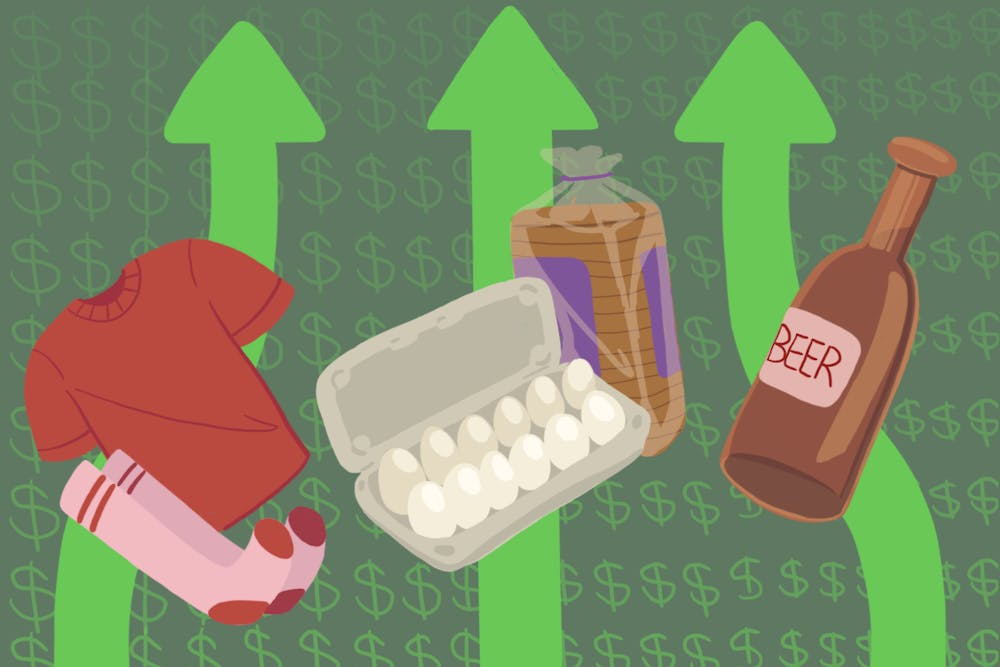With the Trump administration's new tariffs having the potential to increase public spending, University students and businesses in Arizona are preparing to adjust for upcoming cost changes in day-to-day products.
In Arizona, consumers can expect to see an increased price in fresh produce, rent and house payments, gas, imported beer and liquor, and tourism and tax revenue, according to The Peterson Institute for International Economics.
Some of the tariffs placed on Mexico and Canada were postponed on March 6 for one month to minimize the effect on the automotive industry, according to a White House fact sheet. The administration also placed a smaller tariff on imports from China.
President Donald Trump recently announced that tariffs on steel, aluminum, imported cars and car parts will take effect beginning in April.
READ MORE: Alcohol prices are soon to rise with recent tariffs and may impact Sun Devil nightlife
While tariffs do generate revenue for the government, they also have the ability to significantly raise the price of goods and services for the average citizen, Domenico Ferraro, an associate professor of economics at ASU, stated in a letter.
If the U.S. imports a bottle of wine for $100 at port entry and a 25% tariff is placed on it, the grocery store will have to pay $25 per imported bottle to the U.S. government, Ferraro wrote.
In this example, the cost of selling the wine increases by 25%, and if the grocery store does not change the price it will face a decline in profits, reducing the welfare of the store's owners, Ferraro explained.
"However, grocery stores can and most likely will charge a higher price for wine so that part of the tariff passes through to consumers," Ferraro wrote.
How much of the price increase is passed to the consumer depends on the price elasticity of demand for wine, Ferraro wrote.
"Either way, the tariff hurts consumers by altering their favorite wine consumption," Ferraro wrote.
For some businesses neighboring the University, they already anticipate an uptick in their business' expenses.
"Everyone is going to see an impact, whether you're a business owner or not," said Adriana Zapata, the owner of Cocina Adamex, an authentic Mexican restaurant in downtown Phoenix.
For businesses like Zapata's that use hefty amounts of produce daily, the impact of tariffs is a growing concern.
The restaurant has begun preparing for the price of avocados to rise, Zapata said. Avocados are a low-yield fruit, meaning they require large quantities to meet demand.
To mitigate increased costs, Zapata said the restaurant will adjust operational strategies.
This includes pulling back on dishes that automatically come with avocado and asking for customer preference instead. Zapata also said ensuring employees make correct amounts to avoid food waste with the fruit's quick lifespan will be important.
Though Zapata said it's a last resort, if prices rise beyond a certain point, she said what will most likely happen is a price increase "which, unfortunately, goes back to our consumers."
As tariffs may increase the price of day-to-day items, some students are planning to change their spending habits, adjusting to the probable up-charge in routine products.
Bridgette Sypniewski, a senior studying Earth and space exploration, said she is planning to save money by cooking at home more often, instead of buying fast food when she is on the go.
"I would probably try to do as many things as I can from home," Sypniewski said.
Sypniewski said she heavily prioritizes tipping when it comes to grabbing food, so to be able to continue to tip as much as she would like, she would have to be more mindful with her money.
"I would have to plan stuff out so much more," Sypniewski said.
READ MORE: Recent changes in trade policies may lead to students paying more for imports
Annie Thompson, a graduate student studying geological sciences, also said she would have to make major alterations to her lifestyle if prices increase.
Instead of changing how she shops and eats, Thompson said she would focus on adjusting the luxuries in her life that are most expensive, such as her rent as someone who lives alone.
If prices stay high long-term, Thompson said she may have to get a roommate to afford daily costs.
"I try not to pay for things that I don't need," Thompson said. "It would just be hard."
Thompson said she's frustrated that students may have to face the financial consequences of tariffs, while the government benefits from them instead.
"It makes me mad that the political decisions that are going on right now are negatively affecting everyone, except for the very, very rich," Thompson said.
Edited by Senna James, Abigail Beck and Alexis Heichman.
Reach the reporter at ehprest1@asu.edu and nrodri74@asu.edu and follow @ellis_reports on X.
Like The State Press on Facebook and follow @statepress on X.
Natalia is a sophomore studying journalism and mass communication with a minor in creative writing. This is her second semester at The State Press.
Ellis is a sophomore studying journalism and mass communication. This is her first semester with The State Press. She has also worked at Arizona PBS and Blaze Radio.




